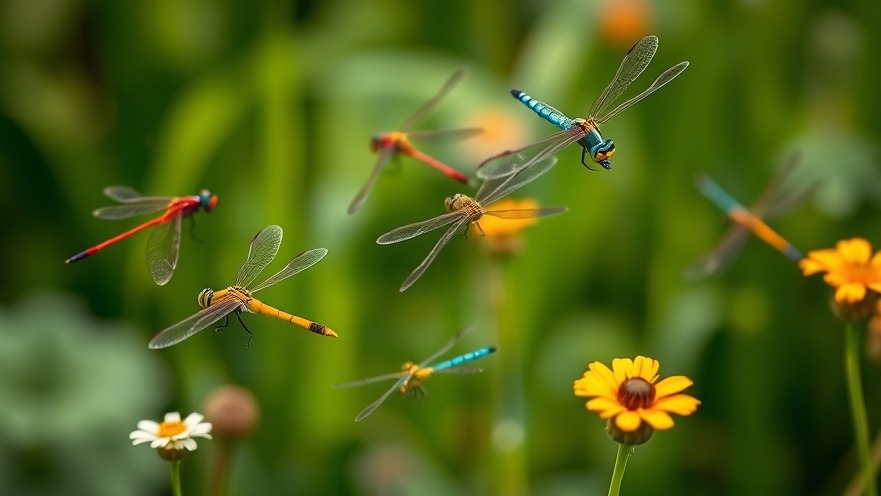
Dragons and Damsels: Guardians of Our Gardens
In the enchanting realm of backyard ecosystems, few creatures capture the imagination quite like the Odonata order, encompassing dragonflies and damselflies. These remarkable insects are not just beautiful; they play an essential role in shaping healthy garden environments. This article explores their fascinating lives, their benefits to eco-friendly gardening, and the urgent need to preserve them amid declining populations.
Understanding the Odonata Order
Belonging to an ancient lineage, Odonata are found all over the globe, with Texas alone hosting over 200 species. Their life cycle is a unique adventure: starting as water-dwelling nymphs, known as naiads, they undergo several transformations before emerging as agile adults. Their adult life is reminiscent of aerial dancers — a sight for sore eyes and a delight for gardeners.
The Essential Role of Dragonflies and Damselflies
Odonates contribute significantly to controlling pest populations. They feast on a variety of insects, including mosquitoes, gnats, and even pesky flies that can disrupt our gardens. As eco-conscious homeowners, understanding the roles these creatures play can help us integrate their needs into our gardening practices. By fostering habitats for dragonflies and damselflies, we naturally reduce the reliance on chemical repellents and pesticides.
Creating a Welcoming Habitat
To support these charming insects, one must consider their environmental needs. Installing a pond or water feature can provide a sanctuary for Odonate naiads. Moreover, native plants around water sources can enhance the biodiversity of your garden. Not only will these plants attract various pollinators, but they will also provide the necessary environment for breeding and feeding dragonflies and damselflies.
Water Conservation: The Lifeblood of Odonates
Maintaining a sustainable water source is critical for the longevity of Odonate populations. You can practice water conservation by using rain barrels, streamlining irrigation systems, and planting native species that require less water. These methods not only assist with water management but also work hand-in-hand with energy-efficient practices in your home design.
Connection to Nature in Your Backyard
Observing the vibrant dynamics of dragonflies and damselflies can be transformative. Engaging with the natural beauty of these insects go beyond mere aesthetics; it fosters a deeper connection to our environment. There’s profound joy in watching a neon skimmer dart and hover, reminding us all of the delicate balance of our ecosystem.
Combatting Declining Insect Populations
Unfortunately, the populations of dragonflies and damselflies have seen declines. Factors such as habitat destruction, pollution, and climate change pose significant threats to their survival. By incorporating zero-waste practices and natural landscaping in our gardens, we can create an oasis that not only supports Odonates but also mitigates climate impacts.
Implementing Actionable Tips for Eco-Friendly Gardening
Start with these step-by-step practices:
Encourage Insect Diversity: Plant a variety of species to create a balanced ecosystem. This fosters natural predation that keeps pests at bay.
Limit Pesticide Use: Create a healthy environment by relying on biological pest control methods. Employing beneficial insects can keep harmful populations under control without resorting to chemicals.
Clean Your Water Feature: Regular maintenance of your pond will keep it healthy for naiads and adults alike. It is crucial to rescue those emerging larvae when cleaning to give them a fighting chance.
By integrating these practices, you contribute to a more sustainable gardening approach while also supporting the wonderful creatures that call your garden home.
Embracing Sustainable Home Design
As eco-conscious homeowners, we can enhance our properties while adopting practices that support biodiversity. Integrating natural elements such as ponds not only adds beauty but becomes a living system that nurtures your garden and the creatures within it. Sustainable home design should always celebrate these intricate connections.
Final Thoughts: Nature's Artwork in Your Garden
Watching dragonflies and damselflies bring life to your garden can be an inspiring reminder of what it means to co-exist with nature. Let us facilitate their presence, ensuring that future generations experience the wonder of these remarkable insects. Armed with knowledge, we can transform our backyards into vibrant ecosystems that prioritize both beauty and sustainability.
As you embark on your eco-gardening journey, consider reaching out to local ecological groups or leveraging online resources to expand your green thumb. The time spent cultivating a garden's natural beauty pays dividends in both joy and environmental impact.
 Add Row
Add Row  Add
Add 




Write A Comment